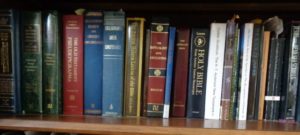And God saw the light, that it was good: and God divided the light from the darkness. (Gen 1:4 KJV)
The Brenton translation of the Greek Septuagint says:
And God saw the light that it was good, and God divided between the light and the darkness. (Gen 1:4 Brenton)
It was recently pointed out to me that the Hebrew word “beyn” (H996) translated above in the KJV as “from” appears twice in Genesis 1:4: once before the light, and the other before the darkness.
And upon further inspection in the Greek Septuagint, I see the phrase “ana mesos”, translated as “between” also appears twice in this verse.
A more proper translation of this then would be:
…And God divided between the light and between the darkness.
Given this, I don’t know how accurate my previous statement is, that this means God made a distinction between the light and the darkness.
Perhaps this verse is telling us He made distinctions between each: a distinction between the light, and a distinction between the darkness.
I still believe light is not darkness and darkness is not light, that they are two different things. Clearly God called them two different things in verse 5: “day” and “night”. But this verse may be meaning something more than what I first thought based on the English translation.
Hmm, very interesting.


Hi Carrie! From my studies of Hebrew, I have learned that the syntax is different than it is in English. In Hebrew, it is written that something is “between” or “beyn”, this and “between” or “beyn” that – twice. See Gen. 1:7 and 1:14 in Hebrew. In English we would say Elohim divided “between” this and that…. but in Hebrew it is expressed as Elohim divided “beyn/Between” this and “beyn/Between” that. It is simply understood to be a division/separation “between/beyn” the 2 things. See also, Gen.3:15, Gen.9:12. There are 408 occurrences of this phraseology in the Hebrew TANAKH.